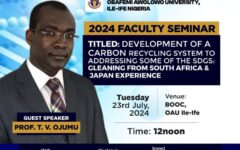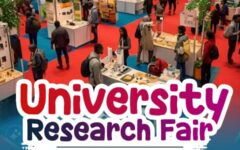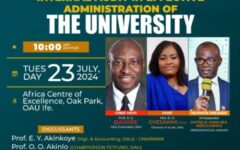Vice President, Prof. Yemi Osinbajo’s Speech at the OAU 60th Anniversary
December 13, 2021 2022-11-18 10:11Vice President, Prof. Yemi Osinbajo’s Speech at the OAU 60th Anniversary
SPEECH BY HIS EXCELLENCY, PROF. YEMI OSINBAJO, SAN, GCON, VICE PRESIDENT OF THE FEDERAL REPUBLIC OF NIGERIA, AT THE 60TH ANNIVERSARY OF OBAFEMI AWOLOWO UNIVERSITY, IN OSUN STATE ON THE 11TH OF DECEMBER, 2021
PROTOCOLS
I bring you the warm felicitations of President Muhammadu Buhari to the graduands, as well as the university community on your 60th Anniversary. As you know, I am, at his direction, standing in today as a visitor to the University.
I also thank you for the kind invitation as the Special Guest of Honour today.
The calibre of honorary graduands at today’s ceremony speaks to the high standards of Obafemi Awolowo University and may I congratulate Kabiyesi, the Ooni of Ife, Enitan Ogunwusi, Ojaja II, a man who has, in a few short years, redefined the exalted throne of the Ooni, by deliberately empowering the next generation, building bridges from the West to the East, the North and the South, and serving our race with passion and zest.
Also to Chief Michael Ade-Ojo, I say congratulations, Sir, for proving time and time again that you can do business honestly and fairly and still be wealthy and successful. By establishing a University and several other altruistic deeds, you have clearly demonstrated that the real value of wealth or status is in the service that is rendered by such means to others.
Hearty congratulations also to those being awarded the Doctor of Philosophy degrees today.
I must also pause to celebrate my colleagues in academia; the great scholars and fine academics who make up the faculties here at the OAU, you are the thought leaders at a historic moment, whose great task is to guide the present and inspire the future.
The Convocation Lecturer, my brother and friend, Arakunrin Oluwarotimi Akeredolu, SAN, and Supreme Commander of Amotekun, Governor of Ondo State; a wealthy, successful lawyer and alumnus of this university, who has given us much to ponder and reflect upon. I salute him for such a thoughtful and insightful lecture.
And to the real reason why we are here, the graduands; congratulations to you and, of course, all the family members and friends here to witness this great day.
A diamond jubilee is certainly worth celebrating and anyone who owns a diamond would take any opportunity to show off its strength and quality. For this University, OAU (and you will permit me to refer to it as occasionally as Ife), there is much to show and many stories to tell; stories of the institution itself and many of the incredible successes of its alumni; stories of the triumphs of human endeavour, the primacy of ideas, the creative force of the introspective mind, and the power of vision.
For example, that Ife has one of the most beautiful campuses in Africa was the product of vision, and the imagination of the legendary Prof. Hezekiah Adedamola Oluwasanmi, his colleagues and collaborators of that era.
In an autobiography, ‘Audacity on the Bound’, written by Ambassador Olu Sanu, one of Nigeria’s pioneer diplomats who studied at Harvard University around the same time as Prof. Oluwasanmi, and later became a Professorial Fellow at OAU, states that, “the magnificent Obafemi Awolowo University was the toil and sweat of Hezekiah Oluwasanmi.” I think it is very fitting indeed that the University library, the symbol of learning and culture, is named after this great man.
This university, OAU, is and continues to be very much a bastion of progressivism and innovation. And not surprisingly, you will find the phrase “Aluta against all oppression” in the Great Ife anthem.
This progressivism is evident in the outlook of staff and students alike, including alumni who are governors like my learned brother. The great Ife Socialist School of Thought, the Ife Collective, with seminal thinkers like Segun Osoba, Sesan Dipeolu, Toye Olorode, Oladipo Fashina, Segun Adewoye, G.G Darah and others, were here, mutually reinforced by their counterparts at the Ahmadu Bello University.
It was here at Ife, that Awo, Chief Obafemi Awolowo, for many years as Chancellor of this University, gave some of the most memorable and consequential lectures on the political economy of Nigeria, and addressed some of its most crucial problems, including the imperatives of democracy, national economic development, the ideology of governance, and the famous national census figures.
It was while still teaching here also that Prof. Wole Soyinka won the Nobel Prize for Literature in 1986. But less well known is the fact that he was also a lecturer at the University of Ife, Ibadan Campus, in the early 1960s when he started his earliest skirmishes with State authorities. And it seems that Wole Soyinka attracted a new tribe of literary insurgents into Ife, ‘insurgents’ because they represented a more aggressive politically and socially conscious literati than their forbears at Ibadan.
I am talking of the likes of Biodun Jeyifo, Kole Omotosho, Yemi Ogunbiyi and G.G Darah. Yemi Ogunbiyi and Biodun Jeyifo and a few more Ife literati joined Alex Ibru, Stanley Macebuh and Lade Bonuola to radically and permanently change the face of print journalism in Nigeria with the establishment of The Guardian newspapers.
But that was a generation of men who are now 70 years old and over. Now, several generations later, sitting in his hostel room here at the OAU, Seun Osewa, then an undergraduate, developed a revolutionary journalism idea, this time technology-based, Nairaland, now possibly Africa’s largest Internet forum. Nairaland has 2.5 million registered users, almost 10 times more readers than all Nigerian print newspapers put together.
Talking about founding businesses in the hostels, I am sure we all know the now multimillion-dollar job website, Jobberman. It was founded here at the OAU in 2009 by Olalekan Elude, Ayodeji Adewunmi and Opeyemi Awoyemi, at the time students of Obafemi Awolowo University, Ife.
It was here at Ife, in this place of deep culture that the Ori Olokun Acting Company was founded by Prof. Ola Rotimi, from where the award-winning dramatic tragedies – ‘Kurunmi’ and the “Gods Are Not to Blame’ came. And from here also hailed, more recently, the eloquent historical excursions of Prof. Toyin Falola, who is at the University of Texas at Austin, USA.
These pioneers and greats inspired a generation of artists that established Nigeria’s primacy in the Creative Arts. Young artistes trained at OAU are continuing in this strong literary tradition. Lagbaja, the iconic masked musician, is an Ife alumnus, whose father was faculty here. Dami Ajayi, who studied medicine here but went on to co-found Saraba Magazine; Emmanuel Faith, an up and coming poet who is helping to promote the reading culture through ‘Bookathon’ where members read at least five books per month.
But the stories of Ife go beyond its history. Ife has also proved to be a place of cutting-edge innovation and even more so, a place for the incubation of tomorrow’s solutions. In 1974 at a convocation ceremony held here at Ife, Chief Awolowo captured the centrality of man in the advancement of our world when he famously said, and I quote: “Man is the sole dynamic in nature and accordingly, every individual in Nigeria constitutes the supreme economic potential which this country possesses.”
So we must be proud of the far-sightedness of the faculties and management of this great citadel of learning. OAU was very much ahead of its time when it named its medical faculty, the Faculty of Health Sciences, and its engineering faculty, the Faculty of Technology.
The Faculty of Health Sciences at Ife was unique from the emphasis that it laid on community medicine and the attainment of a B.Sc Health Sciences degree before proceeding to study for the medical degree of MB.ChB. So, not surprisingly, the University has produced top-notch researchers in several areas of medicine, but in particular, Public Health.
I had the pleasure of meeting with Professors Adesuyi Ajayi and Femi Babalola, both Ife alumni, when they undertook ground-breaking research and clinical trials into the potential use of Ivermectin as a prophylactic and cure for COVID-19.
Prof. Oluyinka Olutoye, another alumnus of the Faculty of Health Sciences attained global recognition when he led a team of surgeons to successfully take a 23-week old baby out of her mother’s womb, removed a tumour from the baby and returned it to the mother’s womb where the injuries from her operation healed and she continued to grow until she was born, the second time at 36 weeks.
The Faculty of Technology was one of the first to include electronics in its electrical engineering programme, and so not surprisingly, the early leaders in technology and tech-enabled businesses, were alumni of OAU’s Department of Electronics and Electrical Engineering.
Segun Ogunsanya, CEO of Airtel Africa, and Karl Toriola, CEO of MTN Nigeria, are alumni of Ife and another great Ife alumnus and product of this same department. Prof, Akintayo Akinwande, who teaches at the Massachusetts Institute of Technology, is one of the world’s most respected professors of electrical engineering and computer science.
Only last week, another alumnus of the Electronics and Electrical Engineering Department, Funke Opeke, made global investment news when Equinix, the global conglomerate announced that it was acquiring MainOne, the company she founded, for $320million.
MainOne owns West Africa’s first privately owned, open access undersea high-capacity cable. It’s a 7,000-kilometre cable stretching from Portugal to West Africa, with landings along Accra, Dakar, Abidjan and Lagos.
I am sure that the Department of Agricultural Economics must be wondering how I forgot their two most celebrated alumni; Dr. Akin Adesina, President of the African Development Bank, and winner of the World Food Prize, and Dr. Okey Oramah, President of Afrexim Bank, who obtained both his MSc and PhD here at OAU.
To the graduands today, you have some of the highest and broadest shoulders to stand on, but it is this generation that must deal with the biggest issues that confront the world, and our nation.
It is big and innovative ideas that will solve those problems. You will have to confront the problems of climate change, and a world moving away from fossil fuels, and you will usher in the age of renewable energy and green solutions.
You will deal with the issues of feeding, educating, providing healthcare and jobs for the fourth largest population in the world in a few years to come. We will need smarter agric solutions to feed these huge numbers.
Technology is already helping to crowd-fund agric and develop more prolific seedlings. Education needs hundreds of new solutions, we will not learn and teach in the old ways in another few years, and we have to design ways of teaching millions, even outside of classrooms. There are many young men and women already doing great things using technology to reach children in far-flung areas with education.
You will confront the need to vastly improve our public and clinical healthcare. We must build on the work of the Genomics Centre at Ede, and the local vaccine production efforts going on already and make drugs locally for hundreds of millions of Nigerians.
The insecurity problems we are experiencing, the rise of terrorism in several parts of this large country and access lethal weapons by non-state actors tell us that we must be smarter in policing the country, using smart drones and surveillance equipment.
The politicization of importation of ammunition tells us that we must manufacture our own arms. Already, Proforce, a Nigerian led by Ade Ogundeyin, is manufacturing APCs and MRAPS in their factory in Ode Remo and exporting to several African countries. So are Imperium, and the government-owned DICON is producing different types of munitions.
The future is smart weapons benefiting from A.I and Machine Learning. Yes, the challenges are huge, but you are well equipped to resolve them, and the evidence is here already.
Since 2016, despite two recessions, young Nigerians have built 6 Unicorns. A unicorn is a company that is valued at over a billion dollars.
It was Awo who said right here in Ife, that it is effective economic planning and even more effective implementation that will enable us to avoid the disaster and reap phenomenal progress instead. Our third National Development Plan 2021-2025 is an attempt to chart a path for the future. That future belongs far more to you graduands, so you need to pay attention to it.
One of the crafters of the plan, Ambassador Yemi Dipeolu, is here with me. He is the Special Adviser to the President on the Economy, and also an alumnus of OAU, who lived all his life here on this campus. His father, Mr. Sesan Dipeolu of blessed memory, was Ife’s first African Librarian.
The strategic objectives of the National Development Plan include establishing a strong foundation for a diversified economy, investing in critical infrastructure, in particular, power and broadband, enabling human capital development and improving governance and strengthening security and its implementation; and is expected to be supported by a range of measures of fiscal, monetary and trade measures.
The plan emphasizes the creation of an average of 5 million jobs per annum during the period. In addition to job openings, it is also essential for Nigerian youths to acquire the skills and knowledge of the workplace. This is why we are working with the United Nations Development Programme, the European Union and other partners on the Jubilee Fellows Programme, which is a one-year work placement scheme for 20,000 young Nigerians annually over the next five years, starting in 2022.
The National Development Plan focuses on value addition, across all sectors including agriculture, manufacturing, solid minerals, digital services, tourism, hospitality, sports and entertainment. In agriculture, for example, equal attention is given to primary production as well as other aspects of the value chain such as storage, transportation, processing, marketing and exports.
In a similar context, the Plan places great emphasis on increasing exports of goods and services, especially leveraging on the African Continental Free Trade Agreement. There are several different aspects of the Plan and I hope that you’d get an opportunity to read the summary of it.
So let me again congratulate the Honorees and the graduands and I pray for you individually that you will do much better than all your predecessors we have mentioned today. And to the University at 60, I pray that the next 60 years will be more fruitful and more fulfilling and make this an even greater university.
God bless the Obafemi Awolowo University.
God bless the Federal Republic of Nigeria!





